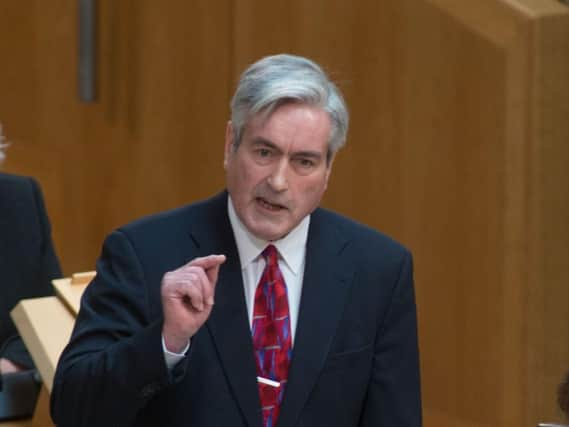Holyrood hears of the 'darkness' of the Rwandan genocide 25 years ago


Holyrood’s debating chamber fell silent today as MSPs listened intently to the personal reflections of Scottish Labour’s Iain Gray, who 25 years ago visited Rwanda in the aftermath of the mass genocide which had erupted bloodily and savagely, on April 7 1994 and which, by it's end, saw around one million killed.
In an emotional speech, which at times brought him close to tears, Mr Gray said he still "burned with shame" at the lack of intervention to stop the genocide.
Advertisement
Hide AdAdvertisement
Hide AdA former Oxfam official, Mr Gray spent time with the charity’s emergency team in eastern Zaire, before going into Rwanda itself. Today, he told MSPs that the country is currently observing 100 days of national mourning, to mark the anniversary of the day in 1994 when the Hutu people turned on their friends and neighbours.
By the end of the slaughter, around 70 per cent of the Tutsi population were dead and, fearing retribution, the millions of the Hutu population fled.
“Appalling atrocities were committed by the armed forces, by the Hutu Interhamwe militias, but also by civilians against other civilians, neighbour against neighbour," he said. "Most of this, barely believable intensity of murder, was perpetrated with nothing more than machetes."
Mr Gray said that while with Oxfam he campaigned and lobbied to have the international community intervene. “They refused. The UN had a peacekeeping force in Rwanda, their commander, general Dalliare had told his superiors in the infamous “genocide fax” that genocide against the Tutsis was being planned.
“The UN were told only to protect foreign nations - not to intervene in the murder of the Tutsi people, and the UN force was then largely withdrawn. It is said that they burned their blue berets in shame as they left.”
He said that "to this day I burn with shame” that the UK did not intervene militarily in the genocide and he said that suggesting genocide could never happen again was untrue.
“We let this happen in Rwanda, we let it happen a year later in Srebrnica in Bosnia. Instead of patting ourselves on the back at our empathy for the genocides of the past, ask ourselves which genocides of today are we turning those backs?
“Genocide ends with machetes and murder, but that is not how it begins. It begins with the words of hate. The othering of Tutsis by Hutu extremists had gone on for a long time.
Advertisement
Hide AdAdvertisement
Hide Ad“This is the lesson we must learn. We cannot, must not, will not tolerate the language of hatred, of othering, of dehumanisation anywhere, ever. Perhaps then we will earn the right to say “never again”
“Our message to the people of Rwanda – we let you down in 1994, but you have our solidarity, our prayers and our love now in your 100 days of mourning, and we will try to do better in future.”
However Mr Gray also celebrated the strides the country had made to heal itself. “Rwanda emerged from the genocide devastated. Life expectancy had fallen to 29 years. There were 95,000 orphans,” he said.
“But in the ensuing years great progress has been made, and although 38 per cent of that country’s people still live in poverty, life expectancy is now 67 and economic growth averages at 7.5 per cent.
“We must recognise the progress that has been made since, and the support and solidarity that we all still must show as one of Scotland’s key partners in international development.”
Highlighting the work of charities such as Comfort Rwanda and Tearfund Scotland, he said his own constituency of East Lothian held Rwanda in “a special place in its heart”.
“During the 2014 Commonwealth Games, the Rwandan team was hosted by East Lothian, and those links have continued through sport and local schools, for example Tranent Colts Football Club who have sent delegations to do coaching and community building work in Rwanda,” he said.
“”We can hardly imagine how difficult it is to heal the wounds of such a thing as this. Some of the leaders of the genocide have been tried, convicted and imprisoned. But the guilt was
Advertisement
Hide AdAdvertisement
Hide Adwidespread and the Tutsi people of Rwanda still have to undertake acts of forgiveness and reconciliation that we can hardly understand every single day.”
He also welcomed the Parliament “taking time to reflect on the genocide and commemorate its 25th anniversary. “I will never forgive the failure of the international community to intervene,” he says. “We must never forget, but we must also the lesson of where the language of hate and division leads.”
Welcoming Mr Gray’s debate to mark the anniversary of the genocide, Dr Callum Henderson, Honorary Consul of Rwanda in Scotland said: “This is a deeply significant time in Rwanda's journey of recovery from the genocide against the Tutsi.
“Twenty-five years after the horrific events of 1994 there are still many who bear the scars of trauma and loss. The involvement of the Parliament in this motion and debate is greatly appreciated by the Rwandan community of Scotland and the Rwandan people.
“It is a strong signal of support for the healing of Rwanda and the process of reconciliation."
